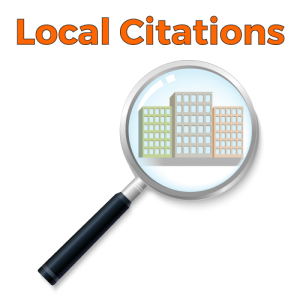How to Acquire Legitimate Links
Acquiring legitimate links is a touchy subject.
Why? It takes some understanding to execute it correctly and the best practices change frequently.
We’ve written this post to help you understand the current best practices (“current” = as of the writing of this page). However, we want to disclose that what is considered “legitimate” in terms of acquiring backlinks to your site can change at any time, so exercise these tips with caution.
There are two trains of thought on this subject, formed by black hat SEOs and white hat SEOs. “White hat” people attempt to follow the ever-changing rule book. “Black hat” people do anything in their power to exploit search engines.
We here at Orange Fox take a firm stance as a white hat company. This means the following content is written from the perspective that following the rules the search engines have established is best.

Your objective in this chapter is to be able to incorporate legitimate backlinks to your website.
(A Short) History of Backlinking
After a Google update in 2011, everyone said you could no longer build links. Google had been telling people this for quite some time. From that point forward, people began to focus on acquiring legitimate links by creating great content that other sites would post. Examples of this included writing a guest post on another site, or creating infographics for others sites to use that linked back to your site.
So, what did everyone do? They flocked to that idea. After about a year and a half later, Google began penalizing people who did this. Why? It’s hard to say. Google claims it was cracking down on spam. At the same time, many non-spammers were utilizing these strategies because they perceived it as a way to legitimately gain links.
So, what should business owners do?
Great question. It’s much more difficult now to acquire high-quality links that do not lead to a penalty. Also, keep in mind, that what works now could cause a penalty in 6 months.
The good news is that there are still a few sources that have stuck through the changes and continue to improve rankings. These are by no means a “magic bullet” to #1 rankings, but they are worth understanding and in some circumstances, implementing.
Social Media Links
These will typically provide much of an SEO benefit, but they help to establish credibility and trust with the search engines. In addition, visitors to your site might be a little suspicious if you don’t exist on social media.
The big three (right now at least) are Facebook, Twitter and LinkedIn. Simply create a fan page on Facebook, a Twitter profile and a LinkedIn Business page. Make sure you fill them out as much as possible.

It’s also important to note that you need to keep these at least semi-updated so that people know you still exist. We could create a dozen posts about how to build a social media campaign, but for now you just need to know that they need to be updated at least once every couple of weeks.
Each of these sites allows you to link back to your main site and they are very legitimate in the search engines’ opinion. As far as we can tell, that will not change in the future.
You can also find other legitimate social media sites that you can create a profile on for your business. These change from time to time so you will need to find them. Just make sure you aren’t creating dozens of these, just a few that you will be updating relatively regularly will be plenty.
Local Citations
 Definition and Purpose of Citations
Definition and Purpose of Citations
If you aren’t familiar with citations (also known as directories), they are simply websites that list basic information about your business like name, address, phone number (also known as NAP) and, of course, your website. A great example is Yelp. If you’ve never been to this site, it has a ton of great information about local businesses.
These sites are especially great for businesses that have a physical location. It is absolutely vital that all sites have exactly the same information. We cannot stress this enough. This means if it says “Ave.” on one site, it should not say “Avenue” or “ave” on the next site. It is crucial to stay consistent.
High Quality Citations
It is also important to note that you only want to submit to high quality directories. Some of these include: Google My Business (formerly Google Maps or Google Local), Yelp, Bing Places, Yellowpages, Merchant Circle, Angie’s List and Foursquare. Some of these sites will attempt to sell you “upgraded listings” but typically they are not worth the money it will cost (Yelp possibly being an exception).
Focus on Quality Citations, not Quantity Citations
Focus on higher quality citations rather than going for massive amounts of listings. If someone offers to submit your listing to thousands of directories or citation sources, RUN! Most likely these submissions would list your business on junk or spammy sites that could negatively impact your rankings.
Video Sites

Is your business making videos? If not, why?
Videos are incredibly powerful in terms of conversion. In fact, many businesses that are correctly using video will tell you that clients come in and act like they’ve known the business for years even though it’s their first visit. We are not going to dive in to video strategies in this post, but want you to know they can be very helpful to your business. So, if you are creating videos, make sure to link back to your website so people know how to contact you once they finish watching your video.
These links are typically very high quality and can help boost your rankings. Similar to citations, there are tons of sites available to use. However, with video, there are only about 5-10 ones considered high quality. YouTube is the most obvious one and will give you the biggest benefit in terms of being in front of the right audience and providing powerful links. A few other great ones are Daily Motion, Vimeo, Viddler and Veoh. Note: make sure to have your whole URL in the description (including http://) otherwise the link will not be clickable and may turn off some visitors.
Trade Groups and Associations
Most industries have trade groups where you can join only if your business is in that niche (i.e. Association of Realtors). These can be great links because they are both relevant from a thematic standpoint (the site is about the same topic as your site) and because potential clients may find you from that website.
Consider groups such as Chambers of Commerce, BNI, networking groups and Better Business Bureau. These associations often have a fee to join, but if you are already a member, it’s worth getting them to link to your website. Similar to trade groups, you will often receive visitors from these pages because people trust these organizations.
Media and Press
 This can be either good or bad. Often times businesses receive media coverage when they do something wrong, which is negative press. However, if you’re making a sizable donation to charity or are hosting a special event, some media outlets will cover it. Even if it’s not a major media source, it’s still exposure. Getting a link from a local news organization tells the search engines you are relevant to that area. This can lead to better rankings and exposure from their large audience.
This can be either good or bad. Often times businesses receive media coverage when they do something wrong, which is negative press. However, if you’re making a sizable donation to charity or are hosting a special event, some media outlets will cover it. Even if it’s not a major media source, it’s still exposure. Getting a link from a local news organization tells the search engines you are relevant to that area. This can lead to better rankings and exposure from their large audience.
When some people consider the media and the press, they immediately think of Press Releases (aka PR). These are not, by nature, necessarily good or bad. It just depends how you use them. First, make sure you have an actual news story to share. Don’t just create one for the purpose of building links. Next, make sure you are submitting it through reputable sources such as PR Newswire and PR Web. You only need to choose one submission site.
One thing to keep in mind is doing this will garnish a large number of links, so if you are linking with keywords you have a high chance of tripping a penalty in the search engines. Instead, only link with your brand name or with your URL. Make sure to have contact information included, in the event a reporter wants to follow up with you for a story.
Referral Partners
Finally, let’s talk about obtaining links from people you know in a similar niche. You will need to be very cautious when doing this. Remember, a little goes a long way. If you have referral partners that you work with it may be a good idea to have them link to your website.
The best benefit is from exposure to their audience, but the links can still help. A great example would be from the perspective of a person working with a Realtor. In the course of working with a Realtor, that person will typically have to talk with a loan officer, title company, insurance agent, home inspector, and general contractor. In the same way, you could be exposing yourself to another audience that helps to further your business.
All of these people could receive a link from the Realtor’s website and their visitors would benefit from using a helpful resource page. It’s a win-win for everyone involved and the search engines (at least currently) like this. Again, this has to be done within reason.
Final Thoughts
There are a number of other ways to obtain legitimate links beyond what we discussed here. However, those strategies are ever-changing. What works now may not work in 3 months or even worse, putting your site at risk for penalization. Any time someone talks about providing hundreds of links to your site, note in your mind that their practice is probably risky. We don’t advise these types of scenarios. Whenever you think about obtaining a link, a great way to decide whether it is good or bad is to ask your self this question:
Am I doing this solely for the purpose of obtaining a link, or am I doing this because it adds value to the site or places my website where customers can find me?
If the answer is the latter, you have the best chance of being safe. If it’s the former, generally, it is not advised.
You’ve met your objective in this chapter of being able to incorporate legitimate backlinks to your website.